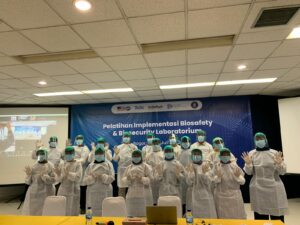
Participants of Training on Implementation of Laboratory Biosafety and Biosecurity management at IPB University
The application of the Laboratory Biorisk Management System (LBMS) needs to be based on the Indonesian National Standard, namely SNI ISO 35001:2019 regarding laboratory biorisk management systems and other related organizations which are intended to be applied to all types of organizations. The implementation of LBMS aims to protect personnel and the environment from work-related hazards that come into contact with hazardous biological materials, prevent contamination and improve environmental quality. Therefore, comprehensive attention is needed in terms of biosafety and biosecurity management in the laboratory. The biorisk management carried out must also be in accordance with a standardized system in order to minimize the risk of harm as well as possible.
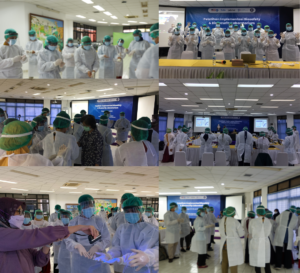
Practice How to Use and Remove Personal Protective Equipment (PPE) Correctly
Recognizing the urgency of implementing LBMS in university laboratories, Indonesia One Health University Network (INDOHUN) through the One Health Laboratory Network (OHLN) program since 2018 has initiated mentoring for the implementation of LBMS to several university laboratories. In 2022, INDOHUN will assist the implementation of LBMS in 5 universities, one of which is the Bogor Agricultural University (IPB) which focuses on 4 laboratories, namely the Primate Animal Study Center, Advanced Research Lab, Faculty of Veterinary Medicine, and IPB Culture Collection. The series of assistances that have been carried out include the laboratory capacity assessment which was carried out on 11-14 April 2022. The results of the assessment found that the 4 target laboratories had common issues in several components of the ISO 35001:2019 SNI assessment.
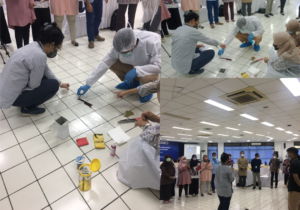
Biological Material Spill Handling Practice
After discussions with the Office of Risk Management and Work Environment Protection (KMRPLK) IPB and 4 laboratories on June 3, 2022, it was agreed that INDOHUN-OHLN supported by the Biosecurity Engagement Program (BEP) and the Directorate of Resources, Directorate General of Higher Education, Research and Technology, the Ministry of Education, Culture, Research and Technology of the Republic of Indonesia in collaboration with KMRPLK held a Laboratory Biosafety and Biosecurity Implementation Training at the Bogor Agricultural University on Monday – Wednesday, 18 – 20 July 2022. This training aims to ensure that the 4 targeted laboratories for assistance can accelerate their capacity, especially human resources to be able to meet the standards of SNI ISO 35001:2019 and become a pilot laboratory with a complete implementation of biosafety & biosecurity.
The activity began with remarks by Prof. dr. Agus Suwandono, M.PH, dr.PH as INDOHUN Coordinator represented by Agus Setiawan, SKM, MPH as OHLN Program Manager, and next remarks by Dr. Ir. Aceng Hidayat, M.T (Secretary of the Institute/Head of the Office of Risk Management and Protection of the Work Environment). The third speech was delivered by Ms. Wahyuni Kamah as Program Manager of the Biosecurity Engagement Program (BEP) in Indonesia and finally remarks by Mohammad Sofwan Efendi, M.Ed (Director of Resources, Directorate General of Higher Education Research and Technology, Ministry of Education and Culture – RI Research and Technology).
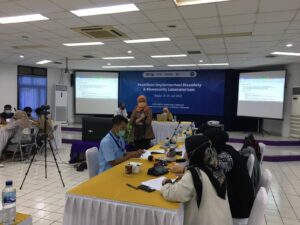
Tabletop Exercise – Risk Assessment
The activity continued with the introduction of the IPB Biorisk Management Implementation Guidelines by KMRPLK, followed by a presentation related to the Lesson Learned Biorisk Management System Implementation by Dr. Uus Saepuloh, S.Si, MBiomed. Then the session continued with the presentation of the training material. The training material for 3 days consists of 14 materials, namely:
- Introduction to Biosafety and Biosecurity
- Laboratory Related Infections
- Hazard Identification, Biorisk Assessment and Control Measures
- Principles of Containment, Physical Security and Equipment Safety
- Good Microbiological Practice and Procedure
- Correct Selection and Use of PPE
- How to use and take off PPE correctly
- Information, Inventory and Storage of Valuable Biological Materials
- Packaging and Transportation of Biologically Hazardous Materials
- Chemical handling and storage in the Laboratory
- Occupational Health and Safety
- Incidents and Emergency Response
- Biological Material Spill Handling
- Tabletop Exercise – Risk Assessment
Each session is opened for training participants to discuss with the presenters. In this training, in addition to getting material, participants are also given hands-on experience using PPE, Biological Material Spills Handling, and risk assessment. The 3-day training activity was closed by giving certificates to participants given by Dr. Ir. Budi Purwanto, ME as Deputy Head of KMRPLK and Dr. dr. Joko Pamungkas, M.Sc as Vice Coordinator of Indohun.
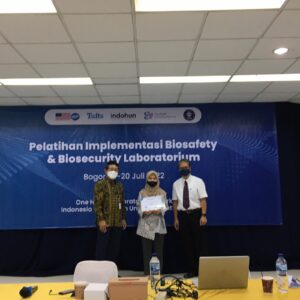
Granting Certificates to Participants in the Biosafety and Biosecurity Laboratory Implementation Training
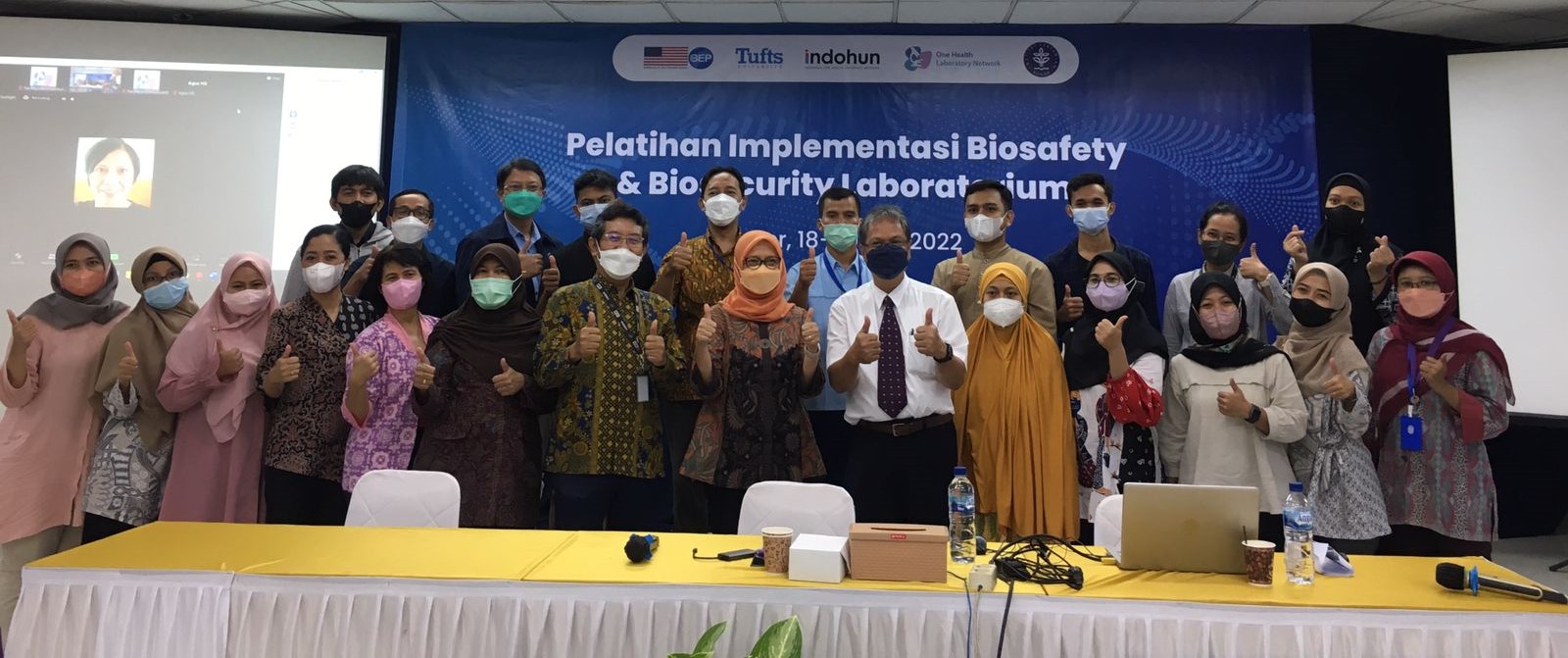

Leave a Reply